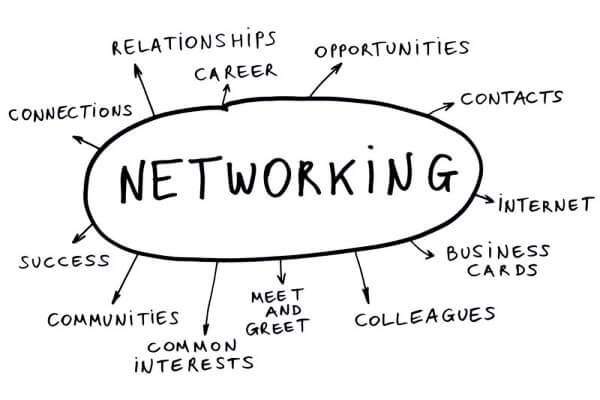Imagine the value of networking for you as an international student, thriving in a new academic environment. But beyond the classroom, a world of opportunity awaits. This is where networking comes in. Building global connections as an international student it’s about unlocking a treasure trove of benefits for your personal and professional life.

Meaning of Networking and Examples
Networking is the process of establishing and sustaining professional contacts with those who have similar interests or work in the same sector. It is about building a network of contacts who can provide you with assistance, guidance, and future possibilities.
Here are some important characteristics of networking.
- Building Relationships: Networking is more than just swapping business cards. It’s about making genuine connections with others and taking an interest in their work and lives.
- Information Sharing: You can share ideas and expertise with others through networking. Your network can provide you with information about career opportunities, industry trends, and possible partnerships.
- Mutual Gain: Collaboration is essential for a network to be successful. In addition to seeking out opportunities and support, you want to be prepared to share your expertise and help with other people in your network.
Here are a few examples of networking activities:
- Attending industry events: Meetings, conferences, and workshops are excellent ways to network with experts in your sector.
- By joining professional associations and online forums, you can meet others who are similar to you in terms of interests and experience.
- Developing connections with coworkers and students: Getting to know the people in your classes or workplace can help you learn, work together, and possibly even gain referrals.
- Information interviews: Contacting professionals in your target field for informational interviews allows you to learn about their careers and gain helpful insights.
- Using online platforms: Professional networking sites such as LinkedIn allow you to connect with professionals all over the world, share your skills and expertise, and look for new opportunities.
Related: Tech Tips For Securing Education, Health, And Financial Peace Of Mind

Main Goals of Networking
Networking has a variety of business and personal benefits. Here’s a breakdown of the main benefits:
Career Advancement:
- Job Opportunities: A solid network can be your hidden weapon for landing a job. Your network can connect you with hidden employment openings, generate referrals, and potentially give you an advantage over the competition.
- Career Guidance: Seasoned professionals in your network can offer invaluable career advice, helping you navigate career routes and find possibilities.
- Mentorship: Your network’s mentors can offer advice, support, and encouragement while you pursue your career goals.
- Industry Knowledge: Networking allows you to keep current on industry trends, learn about new technology, and acquire useful insights from other professionals in your sector.
Professional Development:
- Skill Development: Use your network to connect with colleagues and professionals who can provide learning opportunities, share best practices, and help you build new skills relevant to your field.
- Collaboration: Networking can lead to fascinating partnerships with peers in your area. This can lead to new projects, research possibilities, and professional development.
- Increased Credibility: Being well-connected in your business can help you build your professional reputation and credibility, making you a more appealing candidate for job opportunities or collaborations.
Personal Growth:
- Building Relationships: Networking is much more than just getting ahead professionally. It is about making true connections with others who share your interests or background. This can result in solid connections and a strong support network.
- Cultural Exchange: By networking with people from all backgrounds, you can learn about different cultures, ideas, and ways of life. This can enlarge your perspective and improve your personal life.
- Increased Confidence: Creating a solid network might help you gain confidence. Knowing you have a network of individuals who believe in you may be empowering, both personally and professionally.
Overall, networking is a two-way street that promotes professional and personal development. Actively developing relationships with others exposes you to a world of opportunity, expertise, and support.
Related: Part-Time Jobs For International Students: Balancing Work And Study Abroad

Importance Of Networking For Students
As a student, crossing the academic world and preparing for your future career can feel overwhelming. But here’s a secret weapon at your disposal: networking. Below’s why networking is essential for students:
Academic Powerhouse:
- Academic Support: Feeling lost in a sea of unfamiliar concepts? Upperclassmen, international student mentors, or professors in your network can offer guidance, study tips, and valuable insights to navigate challenging courses and academic requirements.
- Research Opportunities: Professors or researchers within your network might be looking for enthusiastic students to assist with their projects. This can provide valuable research experience and contribute to a strong academic profile.
- Letter of Recommendation Power: Building relationships with professors can lead to glowing letters of recommendation, a crucial element for graduate school applications or future job opportunities.
Career catalyst:
- Hidden Job Market: Never underestimate the value of a solid network Alumni, professionals, or even current classmates with industry connections can tell you about job openings, internships, or volunteer opportunities that aren’t publicly published.
- Informational Interviews: Contact professionals in your selected field for informational interviews. This allows you to learn about their professional routes, obtain useful insights into the sector, and maybe form long-term connections.
- Skill Development: Use your network to contact people who may be able to provide mentorship or opportunities to improve relevant skills through volunteer work or project assistance.
Beyond academics:
- Cultural Exchange: Whether studying abroad or in your nation, networking with people from various backgrounds improves intercultural understanding and broadens horizons.
- Lifelong Friendships: The relationships you make during your studies can lead to lifelong friendships, forming a supportive network that spans geographical boundaries.
How to effectively network as a student:
- Use University Resources: Universities frequently hold career fairs, workshops, and social events to link students with professionals. Take advantage of these chances by actively participating.
- Join Clubs and Societies: Look for student clubs and societies based on your academic interests or hobbies. These offer a relaxed setting in which to meet like-minded people and make connections while pursuing passions.
- Become a Social Butterfly (Online, Too): Attend industry events, workshops, and online webinars relevant to your field. These events provide important learning experiences and networking opportunities. Connect with professionals using online professional networking platforms such as LinkedIn.
Related: Ultimate Guide To Interview Confidence: Conquering Nerves And Crushing Questions

The Value Of Networking In Business
Connections are valuable in today’s fast-paced work environment. Here’s where networking comes in, serving as the golden thread that connects success tales. It’s more than just swapping business cards; it’s about building true relationships that promote growth, open opportunities, and move your company forward.
Creating a business empire:
- Lead Generation and Sales: A strong network can be used to generate leads. Through connections, you may connect with new consumers, partners, and collaborators, broadening your reach and increasing revenues.
- Staying Ahead of the Curve: Your network functions as a knowledge bank. Connecting with industry peers allows you to obtain insights into current trends, learn about new technology, and keep on top of potential challenges and opportunities in your market.
- Increasing Brand Awareness: You can reach a larger audience by showcasing your brand and expertise in networking events and conversations. Positive referrals from your network through word-of-mouth can greatly improve the legitimacy and reputation of your brand.
- Creating Strategic Partnerships: Strategic partnerships can arise from forging solid ties with companies that complement one another. These alliances may provide access to new markets, resources, and knowledge, enabling your company to grow to new heights.
Beyond Transactions:
- Locating Mentors and advisers: Having a strong network can help you find seasoned mentors and advisers who can provide insightful advice, encouragement, and problem-solving techniques as you manage the challenges of managing a business.
- Hiring Top Talent: Are you trying to find the most talented individuals? When it comes to drawing in and hiring the best people for your business, your network may be an invaluable asset.
- Establishing Credibility and Trust: Sincere relationships made through networking help to establish credibility and trust. When closing agreements, getting financing, or cultivating enduring customer connections, this can be quite helpful.
The Expert Way to Network:
- Attend Industry Events: Workshops, conferences, and trade exhibits offer great chances to network with clients, partners, and colleagues in the field.
- Join Business alliances: Like-minded people can be met through networking events, educational resources, professional organizations, and industry alliances.
- Become Involved Online: Make use of professional networking sites such as LinkedIn to establish connections with business executives, exhibit your knowledge, and participate in online forums.
- Prioritize Developing Relationships: Keep in mind that networking is about quality more than quantity. Make an effort to interact with real people, add value to your network, and lend a hand whenever you can.
How To Network Like A Savvy Entrepreneur:
- Target the Right People: Make connections with people who can truly contribute value to your business path. This might include potential investors, industry experts, or entrepreneurs who face similar issues.
- Attend Industry Events: Conferences, trade exhibitions, and workshops are fantastic ways to network with industry peers, potential partners, and investors.
- Become a Master Connector: Networking is not a one-way path. Actively connect with people in your network who could benefit from introductions. This builds trust, improves relationships, and establishes you as an important connector in your ecosystem.
- Leverage Online Platforms: Professional networking sites such as LinkedIn allow you to exhibit your skills, engage with industry experts, and establish your online presence as a thought leader.
Related: Mastering Your Side Hustle: Turning Your Passion Into Profit

How Global Networking Impacts The Entire World
Consider a world in which ideas, resources, and opportunities move freely across boundaries. This interconnectivity, driven by global networking, is profoundly changing our globe. Let’s look at how global networking affects several areas of our world.
Economic boom:
- Commerce and Investment: Global networks connect firms and entrepreneurs all over the world, facilitating international commerce and investment. This opens up new markets, provides jobs, and supports global economic growth.
- Knowledge Sharing: Networking enables the exchange of best practices and new ideas between firms in different nations. This collaboration has the potential to result in the creation of new technology, improved products, and increased efficiency, all of which would benefit customers worldwide.
Social and Cultural Exchange:
- Breaking Down Barriers: Networking crosses geographic barriers, promoting cultural exchange and understanding among people from various backgrounds. This can result in more tolerance, appreciation for diverse cultures, and a more harmonious global community.
- Global Collaboration: Global networks bring together individuals and organizations working on critical issues such as climate change, poverty, and healthcare. Collaboration enables the pooling of resources, experience, and innovative solutions to address these global concerns.
Technological Advances:
- Knowledge Transfer: Networking in the scientific community allows researchers to share findings, collaborate on initiatives, and speed up scientific progress. This could lead to breakthroughs in areas such as medicine, renewable energy, and space exploration.
- Faster Innovation: By connecting with tech talent throughout the world, businesses can access a larger pool of talents and expertise. This fosters faster innovation cycles and the development of cutting-edge technologies that benefit everyone.
Challenges and considerations:
- Digital Divide: Unequal access to technology can limit involvement in global networks, thereby deepening the divide between developed and developing countries. Efforts are required to close the digital divide and promote equitable participation.
- Cultural clashes: Networking across cultures can occasionally result in misunderstandings owing to differences in conventions and communication techniques. Sensitivity and cultural awareness are essential for negotiating such situations.
The Future Of Global Networking:
As technology advances, global networking will become more seamless and widespread. This connection has the potential to result in a more prosperous, collaborative, and innovative world. However, bridging the digital divide and promoting intercultural understanding will be vital in ensuring that the benefits of global networking reach everyone.
Global networking is a powerful force that is reshaping our world. By harnessing its potential and addressing the associated challenges, we can create a future where collaboration, knowledge sharing, and shared prosperity are the norm.
Related: Post-Study Work Opportunities: Navigating Employment After Completing Your Degree Abroad

Networking Important In The Travel Industry
The travel industry thrives on connections. It’s about whisking people away to new experiences, but it’s also about forging relationships that fuel that very magic. Whether you’re a budding travel blogger, a seasoned hotelier, or an aspiring tour operator, having a strong network is your first-class ticket to success. Here’s why networking is essential for anyone navigating the dynamic world of travel:
Opening Doors to Opportunity:
- Unearthing Hidden Gems: Imagine discovering exclusive tours, unique destinations, or special travel deals before anyone else. A strong network of travel agents, local guides, and industry insiders can connect you with hidden gems and exclusive opportunities, setting your business or travel writing apart.
- Landing Your Dream Job: The travel industry is often a tight-knit community. Building connections with recruiters, hiring managers, and travel professionals at conferences, industry events, or online platforms like LinkedIn can open doors to exciting job opportunities you might not have found otherwise.
Building a Collaborative Community:
- Partnerships for Success: Collaboration is key in the travel industry. Networking allows you to connect with airlines, hotels, tour operators, and local businesses to create mutually beneficial partnerships. This can lead to package deals, joint marketing initiatives, and a wider customer base for everyone involved.
- Knowledge Sharing: The travel industry is constantly evolving. By networking with fellow professionals, you can share best practices, learn about new trends, and stay ahead of the curve. This exchange of knowledge keeps your offerings innovative and your services in high demand.
Boosting Your Credibility:
- Building Trust and Reputation: Positive word-of-mouth recommendations are invaluable in the travel industry. Building strong relationships with travel bloggers, journalists, and influencers can lead to positive reviews and features, boosting your credibility and attracting new clients.
- Industry Recognition: Networking allows you to connect with industry leaders and participate in professional organizations. This visibility can lead to recognition within the travel industry, solidifying your reputation and attracting potential partners and clients.
Making Connections that Last:
- Creating Lasting Relationships: Travel is often about forging connections with new cultures and people. Building a network within the travel industry allows you to connect with passionate individuals who share your love for exploration. These connections can blossom into lifelong friendships, enriching both your professional and personal life.
How to Network Like a Travel Pro:
- Attend Industry Events: Travel trade shows, conferences, and workshops offer excellent opportunities to connect with travel professionals.
- Join Travel Associations: Professional organizations like the American Society of Travel Agents (ASTA) or The Travel Bloggers Association (TBEX) provide networking events, educational resources, and connections with industry peers.
- Embrace Social Media: Utilize platforms like Instagram, Twitter, and industry-specific forums to connect with travel enthusiasts, bloggers, and businesses. Share your travel experiences, engage in discussions, and build your online presence.
- Focus on Building Relationships: Networking is about quality, not quantity. Focus on building genuine connections, offer value to your network, and be a reliable and supportive resource for others.
Related: Travel On A Budget: Explore The World Without Breaking The Bank

How Studying Abroad Help With Networking
Studying abroad is an enriching adventure that opens doors to new cultures, academic experiences, and personal growth. But a hidden perk often goes unnoticed: the incredible opportunity to build a powerful global network. Here’s how studying abroad equips you to become a networking champion:
A World of Connections:
- International Peers: Imagine a ready-made network of classmates from diverse backgrounds. Studying abroad allows you to connect with international students, forming friendships and professional connections that transcend geographical boundaries.
- Professors and Mentors: Gaining knowledge from professors is just one benefit. Professors abroad can become valuable mentors, offering guidance on your academic journey and potentially connecting you with professionals in your field.
- Local Experts: Stepping outside the classroom allows you to connect with locals, homestay families, or professionals in your area of interest. These connections provide valuable insights into the local culture and industry practices, potentially leading to future collaborations or job prospects.
Global Networking Skills for Life:
- Cross-Cultural Communication: Effective communication is essential when navigating a new culture. Studying abroad improves your ability to connect with individuals from other backgrounds, which is extremely valuable in today’s globalized society.
- Adaptability and Resourcefulness: Thriving in a new situation helps you become more adaptable and resourceful. These abilities are essential for establishing rapport with people from various cultures and navigating unfamiliar professional environments.
- Stepping outside of your comfort zone boosts confidence and opens you up to new experiences. This makes you more personable and engaging as a networker, helping you to easily develop genuine relationships.
Leveraging Your Global Network:
- Career Opportunities: The connections you forge abroad can open doors to exciting career prospects. Alumni networks from your international university, or connections with professionals in your field you met overseas, can provide valuable job leads and recommendations.
- Lifelong Friendships: The friendships you build abroad can become lifelong sources of support and enrichment. Your global network allows you to stay connected to different cultures, broaden your perspective, and potentially collaborate on future projects.
- Global Citizenship: Studying abroad fosters a sense of global citizenship. Your network becomes a bridge to different cultures, allowing you to contribute to a more interconnected and collaborative world.
Making the Most of Your International Network:
- Embrace University Resources: Many universities offer international student support services and networking events. Take advantage of these opportunities to connect with fellow students and build your network from day one.
- Join Student Clubs and Societies: Explore student organizations related to your academic interests or hobbies. This provides a casual environment to meet like-minded people from diverse backgrounds and build connections.
- Become a Community Explorer: Don’t limit yourself to the classroom. Participate in local events, volunteer in your community, or engage in cultural activities. This allows you to connect with locals and build a deeper understanding of the culture.
Studying abroad is more than just textbooks and lectures. It’s a springboard to build a powerful global network, a network that will support you academically, professionally, and personally throughout your life’s journey. So, embrace the opportunity, connect with people from all walks of life, and watch your global network blossom.
Related: Student Loan Hacks: Beat The Debt Monster And Achieve Financial Freedom
Conclusion
Networking is a long-term investment. Building genuine connections, offering value to your network, and fostering trust is key to reaping the rewards. By actively cultivating your network, you’ll unlock a treasure trove of resources, knowledge, and support. So, step outside your comfort zone, initiate conversations, and build meaningful connections. Watch your network transform into the launchpad that propels your entrepreneurial dreams into reality.

